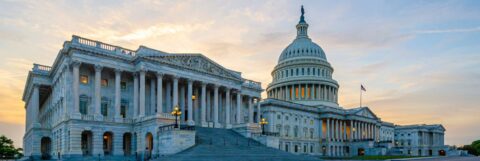This week, the U.S. House took its first steps in moving President Donald Trump’s “one big, beautiful bill,” a budget reconciliation bill with a wide range of Republican fiscal priorities. As of this writing, the over 1,100-page bill has failed to move out of committee due to Republican disagreement over implementing certain cuts. It is now expected to be voted on next week. Many changes in this legislation will impact businesses here in Michigan, and the Chamber will continue to advocate for pro-growth policies.
Budget Reconciliation Faces Push Back in Washington, D.C.
May 16, 2025
Taxes
On taxes, many provisions from the 2017 Tax Cuts and Jobs Act (TCJA) have been preserved. The widely popular Child Tax Credit would be expanded, along with an increase in the standard deduction. Additionally, lawmakers have introduced new temporary tax breaks requested by Trump for overtime pay, car loan interest, and tips. However, due to procedural rules in the Senate, lawmakers were unable to fulfill Trump’s promise to exempt Social Security from taxation. Instead, they would provide seniors with an additional $4,000 deduction. It is uncertain how lawmakers will address the ongoing dispute regarding the $10,000 cap on state and local tax deductions. The proposed legislation aims to increase this cap to $30,000 and introduce a new income limit of $400,000, but it remains unclear if this proposal will gain support from blue-state Republicans who are focused on the issue.
Additionally, this plan phases out the EV tax credit. If a manufacturer has sold 200,000 or more EVs since 2009, it will lose the credit at the end of the year. If it has sold less than 200,000, it will keep the credit until Dec. 31, 2026.
The bill’s current version targets a total of $4 trillion in tax cuts and $1.5 trillion in spending reductions. Although the House initially hoped for up to $4.5 trillion in tax cuts, it abandoned efforts to reach an agreement on the $2 trillion in spending cuts that would have been necessary to meet its budget.
The Chamber has long supported the TCJA and applauds the House for its efforts to preserve these pro-growth financial policies. Read more about the importance of the TCJA.
Education
The Chamber is also watching the education initiative in the bill known as the “Student Success and Taxpayer Savings Plan.” The plan introduces significant changes to the Pell Grant program, addressing funding shortfalls and modifying eligibility criteria for the award. Additionally, the plan imposes stricter limits on the amount of federal student loans borrowers can obtain. It also repeals regulations concerning gainful employment and borrower defense.
A key component of the plan is a risk-sharing provision, which would hold schools accountable for a portion of unpaid student loan balances. Many of the provisions in this plan originate from Republicans’ primary higher education legislation from last session, the College Cost Reduction Act.
A top priority in education for the Chamber is ensuring students have access to affordable continuing education options and the necessary tools to finish much-needed certifications and degrees. The proposed changes to Pell grants, TRIO, and other resources will hinder that success and make it harder for Michigan to get to 60% of Michiganders with a certificate or degree by 2030.
Environment
The environmental workgroup focuses on rescinding unobligated funds from various grant and loan programs at the Department of Energy and the Environmental Protection Agency (EPA) under the Inflation Reduction Act (IRA). This includes programs like the EPA’s Greenhouse Gas Reduction Fund, from which the Trump administration has attempted to freeze or rescind already obligated funds.
Additionally, the committee has removed several clean energy initiatives put forth by the Biden administration. This includes delaying the implementation of the IRA’s methane fee for oil and gas companies by 10 years and repealing two rules designed to accelerate the adoption of electric vehicles.
Health Care
The proposal for health care savings targets Medicaid dollars, specifically implementing a work requirement for many Medicaid recipients. According to the Congressional Budget Office, this policy change could result in over 8.6 million people losing healthcare coverage.
One of the largest potential sources of savings in health care will come from a policy curbing states’ ability to levy taxes on providers. This could force states to make major changes since the taxes can pay for a state’s share of Medicaid costs. The legislation would freeze state provider taxes at their current rates and prohibit them from establishing any new taxes. Every state except Alaska relies on a provider tax of some form. The total savings from all changes are expected to be approximately $800 billion.
